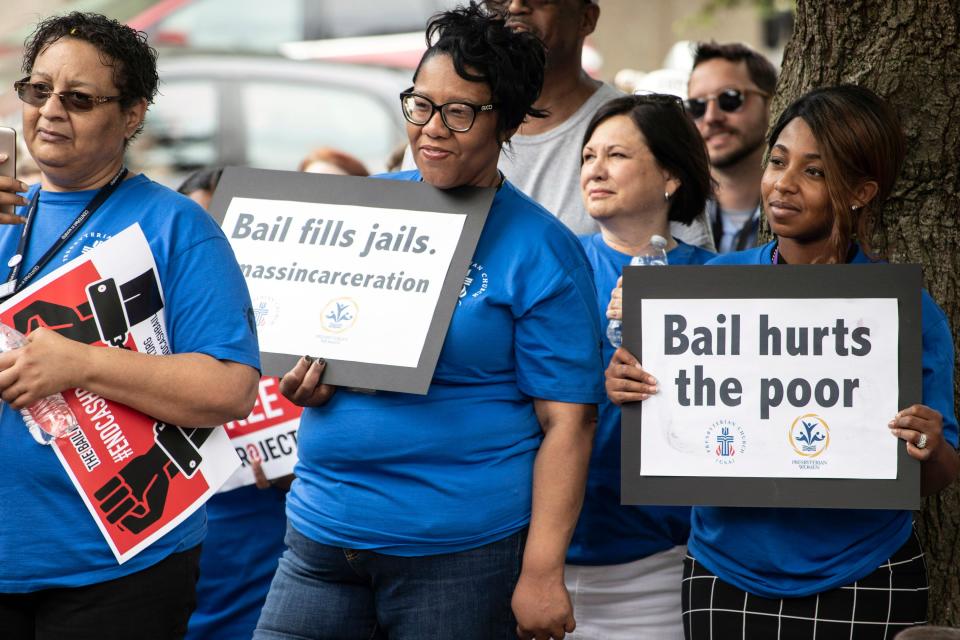How COVID showed us meaningful bail reform is possible in Kentucky | Opinion
I was 19 years old when a car turned left in front of me without looking and I plowed into it. First responders placed me on a stretcher and loaded me into an ambulance. The police officer on the scene asked me for my license and registration. The contents of my purse had spilled in the back seat of my beat-up Buick Somerset on impact. I couldn’t produce them.
Six years later, I was a new mom and got pulled over with my baby in the car. Turns out there was a bench warrant for my arrest for driving without a license. All those years ago, a citation had been issued and I had failed to appear in court. I had no idea. I could have gone to jail that day, but lucky for me — I didn't.
This is the memory that springs to mind when I think of the people dying while under the care of Louisville Metro Corrections. Six dead in two months.
More: GOP lawmakers working to stop groups like Louisville Bail Project from raising bail funds
Lesley Starnes was 36-years-old and being held on a $5,000 bond for non-support charges. He owed more than $5,000 in support so it qualified as a felony charge. His inability to post bail is understandable considering the reason for his arrest. One thing is certain now, he will never pay his support.
It is time for Kentucky to rethink who should be in jail and why.

COVID-19 shows us bail reform is possible
In April of 2020, the Kentucky Supreme Court expanded the Administrative Release program in response to COVID to automatically release certain categories of defendants following arrest instead of leaving the decision to a judge.
That order was amended several times and then replaced in August but it left us with data that Kentucky legislators should use to make informed decisions about bail reform.
The Kentucky Center for Economic Policy analyzed the data from Kentucky’s Administrative Office of the Courts and found that even though thousands more people were released due to the AR program expansion, the state did not see a significant difference in re-arrest rates. In 2020, 11% of people released under emergency orders were re-arrested versus 10% re-arrested following judicial decisions.
The analysis shows that releasing more people pretrial did not increase public safety concerns.
Kentucky should reinstate the emergency expansion of the Administrative Release program as a permanent and meaningful step toward bail reform. COVID-19 is not the only reason people are dying in jail.
Opinion: I retired from Louisville Metro jail. Here's why The Bail Project is needed
Current Kentucky bills
States such as California, New Jersey and Illinois are eliminating bail or heavily reforming their pretrial processes. Meanwhile, Kentucky has two proposed bills that seem to be going in different directions.
Reps. Jason Nemes, R-Louisville, and John Blanton, R-Salyersville filed HB 313 to clamp down on organizations like The Bail Project and Louisville Community Bail Fund. Both organizations help arrested individuals afford bail.
HB 313 aims to amend KRS 431.510 which outlawed the use of a bail bondsman in Kentucky in 1976 and extends that prohibition to also "make operating a charitable bail organization unlawful." Instead of reforming our pretrial processes to make charity bail assistance unnecessary, this bill runs in reverse.
SB 31 on the other hand, was introduced by Sen. Brandon J. Storm, R-District 21, and seeks to limit time in jail for those awaiting trial. The bill says that anyone who can’t afford bail or is otherwise denied pretrial release will have the right to a release hearing after spending a certain number of months in jail without a trial, three months for a misdemeanor charge and six months for a felony. Months! I cannot imagine sitting in jail for three months before trial on a misdemeanor. Doing time without having been convicted of anything yet.
The fact that a bill like SB 31 even exists is a huge red flag that something is seriously wrong with our justice system.
The missing link
A judge asks if a defendant can afford a lawyer, but their answer does not prompt the court to assess the person's ability to afford bail. Making bail remains a luxury reserved for those privileged enough to afford due process.
In 2017, Kentucky amended KRS 534.060 to provide that "no person shall be imprisoned for nonpayment of fines or court costs unless the failure to pay was willful and not due to an inability to pay." This needs to be extended to include bail.
In 1964 Attorney General Robert F. Kennedy testified before Congress that the "problem, simply stated is: The rich man and the poor man do not receive equal justice in our courts. And in no area is this more evident than in the matter of bail...bail has become a vehicle for systematic injustice"
That was 58 years ago, and still, here we are. At the end of December, when data was last updated, over 10,000 people were being held in Kentucky’s county jails. How many more of them have to die waiting for their day in court?
The cop who pulled me over didn’t take me into custody. Instead, he said something about me driving a “nice car” and him knowing the neighborhood listed on my current license was a “good” one. He let me drive home and I hired a lawyer before heading to court.
What if I had been a struggling mom who was not driving a "nice car?" What if I wasn’t white? I shudder to think what would have happened to my daughter that day had we not been able to continue on our way.
Too many people in Kentucky don’t have to wonder. They’re living the horror of landing in jail for a minor offense. We cannot take bail assistance programs away from our community without a better solution. They're the ones applying pressure to the bloody wound that is our justice system in order to stop the bleeding.

Bonnie Jean Feldkamp is the opinion editor for The Courier Journal. Email her at BFeldkamp@Gannett.com and find her on Twitter at Instagram at @WriterBonnie.
This article originally appeared on Louisville Courier Journal: How COVID showed us bail reform is possible in Kentucky | Opinion

